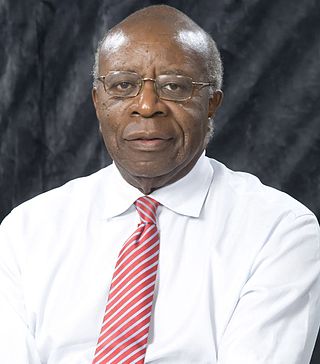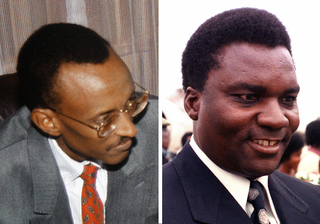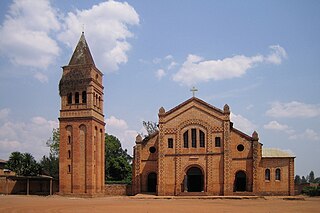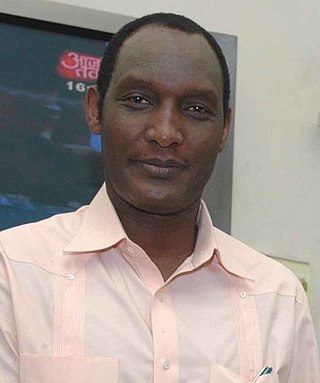Related Research Articles

Juvénal Habyarimana was a Rwandan politician and military officer who was the second president of Rwanda, from 1973 until his assassination in 1994. He was nicknamed Kinani, a Kinyarwanda word meaning "invincible".

Paul Kagame is a Rwandan politician and former military officer who has been the President of Rwanda since 2000. He was previously a commander of the Rwandan Patriotic Front (RPF), a rebel armed force which invaded Rwanda in 1990. The RPF was one of the parties of the conflict during the Rwandan Civil War and the armed force which ended the Rwandan genocide. He was considered Rwanda's de facto leader when he was Vice President and Minister of Defence under President Pasteur Bizimungu from 1994 to 2000 after which the vice-presidential post was abolished.

The Rwandan genocide, also known as the genocide against the Tutsi, occurred between 7 April and 19 July 1994 during the Rwandan Civil War. During this period of around 100 days, members of the Tutsi minority ethnic group, as well as some moderate Hutu and Twa, were killed by armed Hutu militias. Although the Constitution of Rwanda states that more than 1 million people perished in the genocide, the actual number of fatalities is unclear, and some estimates suggest that the real number killed was likely lower. The most widely accepted scholarly estimates are around 500,000 to 800,000 Tutsi deaths.

Faustin Twagiramungu was a Rwandan politician. He was Prime Minister of Rwanda from 1994 until his resignation in 1995, the first head of government appointed after the Rwandan Patriotic Front (RPF) captured Kigali. He soon came to disagree with the RPF's policies and actions, resigned and was placed under house arrest, but managed to leave the country and settle in Belgium. He continued his opposition activity against Paul Kagame's rule, subsequently returning to Rwanda and standing for elections, but without success.

The Rwanda Defence Force is the military of the Republic of Rwanda. The country's armed forces were originally known as the Rwandan Armed Forces (FAR), but following the Rwandan Civil War of 1990–1994 and the Rwandan genocide of 1994 against the Tutsi, the victorious Rwandan Patriotic Front (Inkotanyi) created a new organization and named it the Rwandan Patriotic Army (RPA). Later, it was renamed to its current name.

The Rwandan Civil War was a large-scale civil war in Rwanda which was fought between the Rwandan Armed Forces, representing the country's government, and the rebel Rwandan Patriotic Front (RPF) from 1 October 1990 to 18 July 1994. The war arose from the long-running dispute between the Hutu and Tutsi groups within the Rwandan population. A 1959–1962 revolution had replaced the Tutsi monarchy with a Hutu-led republic, forcing more than 336,000 Tutsi to seek refuge in neighbouring countries. A group of these refugees in Uganda founded the RPF which, under the leadership of Fred Rwigyema and Paul Kagame, became a battle-ready army by the late 1980s.

The Catholic Church in Rwanda is part of the worldwide Catholic Church.
The Roman Catholic Diocese of Cyangugu is a diocese located in the city of Cyangugu in the ecclesiastical province of Kigali in Rwanda. Since 2021, the Catholic Diocese of Cyangugu is entrusted to Bishop Edouard Sinayobye.

Christianity is the largest religion in Rwanda. The most recent 2022 census indicated that: 48% of Rwanda's population is Protestant, 40% is Catholic, 4% belongs to other Christian denominations, 2% is Muslim, 3% claims no religious affiliation, and 3% practices other religions including traditional faiths.
André Kameya (1946–1994) was a Rwandan journalist and politician. After a period in government service he founded the Rwanda Rushya newspaper, which was critical of the Habyarimana government. He campaigned for democracy and was a prominent member of the Parti Liberal. He was killed in June 1994.
Seth Sendashonga was the Minister of the Interior in the government of national unity in Rwanda, following the military victory of the Rwandan Patriotic Front (RPF) after the 1994 genocide. One of the politically moderate Hutus in the National Unity Cabinet, he became increasingly disenchanted with the RPF and was eventually forced from office in 1995 after criticizing government policies. After surviving a 1996 assassination attempt while in exile in Kenya, he launched a new opposition movement, the Forces de Résistance pour la Démocratie (FRD). Sendashonga was killed by unidentified gunmen in May 1998. The Rwandan government is widely believed to be responsible for the assassination.

Presidential elections were held in Rwanda on 9 August 2010, the second since the Rwandan Civil War. Incumbent President Paul Kagame of the Rwandan Patriotic Front (RPF) was re-elected for a second seven-year term with 93% of the vote.

Faustin Kayumba Nyamwasa is a Rwandan former Lieutenant general who formerly was the Chief of Staff of the Rwandan Army from 1998 to 2002. He was also head of Rwandan intelligence from 1998 to 2002 and served as Rwanda's ambassador to India between 2004 and 2010. Nyamwasa has been an opposition leader in exile since as part of the Rwanda National Congress.

Louise Mushikiwabo is the fourth and current Secretary General of the Organisation internationale de la Francophonie. She previously served as the Minister of Foreign Affairs and Cooperation of Rwanda from 2009 to 2018. She also served as Government Spokesperson. She had previously been Minister of Information.

Antoine Kambanda is a Rwandan prelate of the Catholic Church who has been Archbishop of Kigali since 2019. He was Bishop of Kibungo from 2013 to 2018.
Kizito Mihigo was a Rwandan gospel singer, songwriter, organist, composer of sacred music, television presenter, genocide survivor, peace maker and peace and reconciliation activist. Kizito was an iconic activist who dedicated his life to healing the souls of his fellow genocide survivors and rebuilding unity and reconciliation in Rwanda. According to Kisito's words, published on Kizitomihigo.com, he claimed, "The objective of my works is to console and strengthen the wounded hearts, singing peace and forgiveness." His ultimate performance in healing and Peacebuilding started in 2010 when he created the Kizito Mihigo Peace Foundation, a non-profit organization devoted to his cause.
Ishema Party is a Rwandan political movement founded by Rev. Father Thomas Nahimana and other young Rwandan activists and scholars. Among these, are Nadine Claire Kasinge, Chaste Gahunde, Venant Nkurunziza, inter alia. They all met in Paris and for three days, they exchanged on issues facing Rwanda and possible consequences. In conclusion, they decided to start a new political party. That is how Ishema Party was born.
Laurent Mbanda is a Rwandan Anglican bishop. He was the bishop of the Diocese of Shyira when he was elected the fourth archbishop and primate of the Province of the Anglican Church of Rwanda on 17 January 2018, being enthroned on 10 June 2018.
Edouard Sinayobye is a Rwandan clergyman, author and Catholic Bishop of Cyangugu Diocese.
References
- 1 2 3 "Rwandan priest will discuss nonviolence". The World Newspaper. Mar 14, 2016. Retrieved 2017-09-19.
- ↑ "Rwanda: un opposant annonce son retour jeudi à Kigali pour se lancer en politique" (in French). La Libre. November 20, 2016. Retrieved 2017-09-19.
- ↑ Mitari, Par Jean (May 16, 2013). "Rwanda: Le parti Ishema dévoile son programme à Bruxelles" (in French). Jambo News. Retrieved 2017-09-19.
- ↑ Kagire, Edmund (January 24, 2017). "Rwanda Denies Controversial Priest Entry Again". The East African. Retrieved 2017-09-19.
- ↑ Asiimwe, Bosco R (May 13, 2011). "Catholic Church disowns revisionist priests". The New Times. Retrieved 2017-09-19.
- 1 2 Buchanan, Elsa (January 24, 2017). "Opposition leader Thomas Nahimana prevented from returning to Rwanda, again". International Business Times. Retrieved 2017-09-19.
- ↑ "Rwanda: rentrant d'exil pour la présidentielle, un opposant bloqué au Kenya" (in French). rfi Afrique. November 24, 2016. Retrieved 2017-09-19.